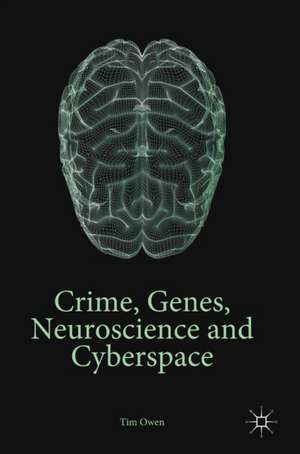Crime, Genes, Neuroscience and Cyberspace
Autor Tim Owenen Limba Engleză Hardback – 2 oct 2017
This book applies Owen’s unique genetic-social framework to the study of crime and criminal behaviour, with an emphasis on cybercrime. Moving beyond challenges which confront contemporary criminological theorizing such as: the stagnation of critical criminology, the relativistic nihilism of the ‘cultural turn’, posthumanism, and virtual criminology, the author codifies and ‘applies’ the latest version of the framework to the study of crime, both in and out of cyberspace.
Drawing upon evolutionary psychology, behavioural genetics and the philosophy of Heidegger, he introduces new terms such as ‘Neuro-Agency’ and notions of Embodied Cognition into criminological theorizing. Adopting a soft compatibilist approach to free-will, and Realist ontology, Owen’s meta-theoretical focus provides a new direction for criminological theorizing, in particular in the direction of the conceptualization and prediction of cyber violence. Exciting and timely, this book willappeal to scholars and advanced students of criminology, law, sociology, social policy, psychology, philosophy, policing and forensic investigation.
Preț: 697.97 lei
Preț vechi: 821.14 lei
-15% Nou
Puncte Express: 1047
Preț estimativ în valută:
133.56€ • 139.80$ • 111.16£
133.56€ • 139.80$ • 111.16£
Carte tipărită la comandă
Livrare economică 31 martie-14 aprilie
Preluare comenzi: 021 569.72.76
Specificații
ISBN-13: 9781137526878
ISBN-10: 1137526874
Pagini: 240
Ilustrații: XIII, 232 p.
Dimensiuni: 148 x 210 x 20 mm
Greutate: 0.45 kg
Ediția:1st ed. 2017
Editura: Palgrave Macmillan UK
Colecția Palgrave Macmillan
Locul publicării:London, United Kingdom
ISBN-10: 1137526874
Pagini: 240
Ilustrații: XIII, 232 p.
Dimensiuni: 148 x 210 x 20 mm
Greutate: 0.45 kg
Ediția:1st ed. 2017
Editura: Palgrave Macmillan UK
Colecția Palgrave Macmillan
Locul publicării:London, United Kingdom
Cuprins
Chapter One. Introduction.- Chapter Two. Criminological and Social Theory: Surveying the Contemporary Landscape.- Chapter Three. Neuroscience and Cybercrime.- Chapter Four. Do We Need a ‘Virtual Criminology’?.- Chapter Five. Cyber Violence.- Chapter Six. Codification and Application of the Genetic-Social Framework.- Concluding Observations
Notă biografică
Dr Tim Owen is Senior Lecturer in Criminology and Director of Uclan Cybercrime Research Unit [UCRU] at the University of Central Lancashire, UK. He is the author of many articles, book chapters and books in criminology, sociology and social policy. Recent books include New Perspectives on Cybercrime, co-edited with Wayne Noble and Faye Speed (Palgrave, 2017).
Textul de pe ultima copertă
This book applies Owen’s unique genetic-social framework to the study of crime and criminal behaviour, with an emphasis on cybercrime. Moving beyond challenges which confront contemporary criminological theorizing such as: the stagnation of critical criminology, the relativistic nihilism of the ‘cultural turn’, posthumanism, and virtual criminology, the author codifies and ‘applies’ the latest version of the framework to the study of crime, both in and out of cyberspace.
Drawing upon evolutionary psychology, behavioural genetics and the philosophy of Heidegger, he introduces new terms such as ‘Neuro-Agency’ and notions of Embodied Cognition into criminological theorizing. Adopting a soft compatibilist approach to free-will, and Realist ontology, Owen’s meta-theoretical focus provides a new direction for criminological theorizing, in particular in the direction of the conceptualization and prediction of cyber violence. Exciting and timely, this book willappeal to scholars and advanced students of criminology, law, sociology, social policy, psychology, philosophy, policing and forensic investigation.
Caracteristici
Applies insights from neuroscience to criminal behaviour, and explores the implications for contemporary criminological theory Builds meaningful bridges between biology and sociological criminology, based on innovative social theory Advances social science research adeptly
